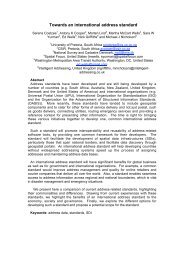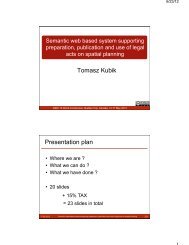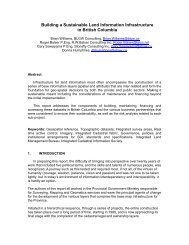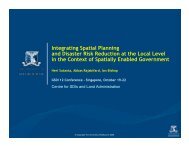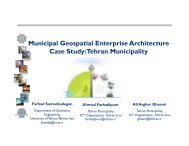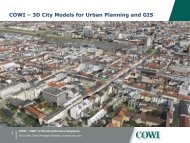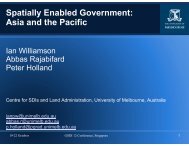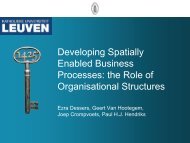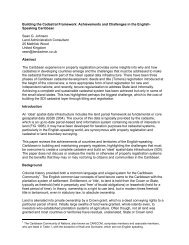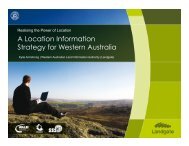SDI Convergence - Global Spatial Data Infrastructure Association
SDI Convergence - Global Spatial Data Infrastructure Association
SDI Convergence - Global Spatial Data Infrastructure Association
You also want an ePaper? Increase the reach of your titles
YUMPU automatically turns print PDFs into web optimized ePapers that Google loves.
4.4 European case law<br />
4.4.1 Rotaru v. Romania<br />
In 2000, the European Court of Human Rights passed an important judgment on the<br />
difference between private and public places in the case of Rotaru v. Romania (ECtHR,<br />
2000). In this case, the ECtHR confirmed their earlier judgments by recognising that<br />
information about the applicant's life, in particular his studies, his political activities and<br />
his criminal record, when systematically collected and stored in a file held by agents of<br />
the State, falls within the scope of ‘private life’ for the purposes of Article 8, ECHR (Ibid,<br />
§ 44.). The Court disagreed with the Romanian government that this information is related<br />
to the applicant’s public life, and therefore did not fall within the scope of ‘private<br />
life’. With regard to public information that can fall within the scope of the right to private<br />
life, the Court made an interesting remark:<br />
“Moreover, public information can fall within the scope of private life where it is systematically<br />
collected and stored in files held by the authorities. That is all the truer where<br />
such information concerns a person's distant past” (Ibid, § 43).<br />
The Court recognised that a right to privacy exists when a government agency systematically<br />
collects and stores personal information, even when this is public information.<br />
4.4.2 P.G. and J.H. v. The United Kingdom<br />
In the case of P.G. and J.H. v. The United Kingdom (ECtHR, 2001), the Court dealt<br />
with the scope of privacy in public places. The applicants complained that covert listening<br />
devices were used by the police to monitor and record their conversations in an<br />
apartment, that information was obtained by the police concerning the use of a telephone<br />
at the apartment, and that, while they were at the police station, listening devices<br />
were used to obtain voice samples.<br />
The most relevant domestic law consisted of the Telecommunications Act 1945 and the<br />
<strong>Data</strong> Protection Act 1984. Section 45 of the Telecommunications Act prohibits the disclosure<br />
by a person engaged in a telecommunications system of any information concerning<br />
the use made of the telecommunications services provided for any other person<br />
by means of that system. However, section 28(3) of the <strong>Data</strong> Protection Act 1984<br />
reads: “Personal data are exempt from non-disclosure provisions in any case in which<br />
– (a) the disclosure is for any of the purposes mentioned in subsection 1 above; and (b)<br />
the application of those provisions in relation to the disclosure would be likely to prejudice<br />
any of the matters mentioned in that subsection.” Subsection 1 refers to data held<br />
for the purpose of: “(a) the prevention or detection of crime; (b) the apprehension or<br />
prosecution of offenders; or (c) the assessment or collection of any tax or duty.” In this<br />
case, the Court concluded that the disclosure to the police was permitted under the<br />
relevant statutory framework where necessary for the purposes of the detection and<br />
prevention of crime (Ibid, § 47).<br />
However, in the Court’s opinion, there is also an area, even in public space, where<br />
people may have interactions, which are protected by the right to privacy:<br />
“There is therefore a zone of interaction of a person with others, even in a public context,<br />
which may fall within the scope of ‘private life’” (Ibid, § 56).<br />
83



